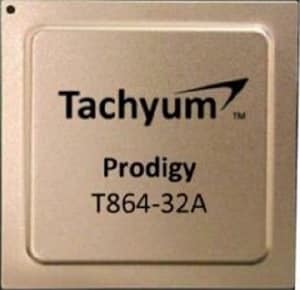- Prodigy processor by Tachyum has given successful results concerning better performance for running legacy applications
- Is beneficial for data centres for enhancing computational performance and manage energy consumption
 Tachyum has announced that its Prodigy Universal Processor has completed software emulation testing across x86, ARM and RISC-V binary environments. This achievement has shown that Prodigy can enable users to run their legacy applications transparently at with better performance than any contemporary ARM or RISC-V processors. Coupled with hyperscale data centre workhorse programs such as Hadoop, Apache and more, which
Tachyum has announced that its Prodigy Universal Processor has completed software emulation testing across x86, ARM and RISC-V binary environments. This achievement has shown that Prodigy can enable users to run their legacy applications transparently at with better performance than any contemporary ARM or RISC-V processors. Coupled with hyperscale data centre workhorse programs such as Hadoop, Apache and more, which
Tachyum is recompiling to Prodigy native code, this capability will ensure that Prodigy customers can run a broad spectrum of applications.
Tachyum also provides the ability to transparently install and run legacy applications using a dynamic binary translator that converts x86, ARM or RISC-V code to Prodigy native ISA (Instruction Set Architecture). Despite software emulation on the Prodigy chip, the ARM and RISC-V binaries will run much faster on Tachyum Prodigy than on ARM or RISC-V available today.
Prodigy outperforms the fastest Xeon processors at 10x lower power on data
centre workloads, as well as outperforming NVIDIA’s fastest GPU on HPC, AI
training and inference. The 125 HPC Prodigy racks can deliver a 32 tensor
EXAFLOPS. Prodigy’s 3X lower cost per MIPS and 10X lower power translates to
a 4X lower data centre Total Cost of Ownership (TCO), enables billions of
dollars of savings for hyperscalers such as Google, Facebook, Amazon,
Alibaba, and others.
Can run wide variety of workloads
By running a web server application on Prodigy using a mix of native and x86 code, the results proved that Prodigy is capable of running heterogeneous system applications efficiently on the same universal silicon, which will provide huge cost benefits to a broad spectrum of users.
Tachyum’s Prodigy can run HPC applications, convolution AI, explainable AI,
general AI, bio AI and spiking neural networks, as well as normal data centre workloads on a single homogeneous processor platform with its simple programming model. Using CPU, GPU, TPU and other accelerators in substitute for Prodigy for different types of workloads are inefficient. A heterogeneous processing system, with unique hardware dedicated to each type of workload (e.g. data centre, AI, HPC), results in underutilisation of hardware resources and a more challenging programming environment. However, Prodigy can seamlessly switch among various workloads with ease.
High-performance model
Prodigy significantly improves computational performance, energy
consumption, hardware (server) utilization and space requirements compared
to the existing chips provisioned in hyperscale data centres. It also allows Edge developers for IoT to exploit its low power/high-performance model, along with its simple programming structure for delivering AI to the edge.
In addition to the native Prodigy code, it also runs legacy x86, ARM and RISC-V binaries. With a single, highly-efficient processor architecture, Prodigy delivers industry-leading performance across data centre, AI, and HPC workloads.
Since Prodigy can switch between data centre, AI and HPC workloads, unused servers can be used as CAPEX-free AI or HPC cloud.
“Having a readily available solution and easy to use with massive amounts of
software, demonstrates the foundation for the success of a platform,” said Dr.
Radoslav Danilak, Tachyum founder and CEO. “This demonstration of Prodigy’s
ability to run software correctly – even legacy code from x86, ARM or RISC-V
processors – shows that we will enable customers to seamlessly use the
applications they are using today from Day One of Prodigy’s launch. This is
another validation of viability for Prodigy and proof of its ability to
unlock unprecedented performance, power efficiency and cost advantages
across the most challenging computing environments.”
Prodigy will be entering volume production in 2021. Currently, the next step is to get a fully manufactured functional FPGA prototype of the chip later this year.






